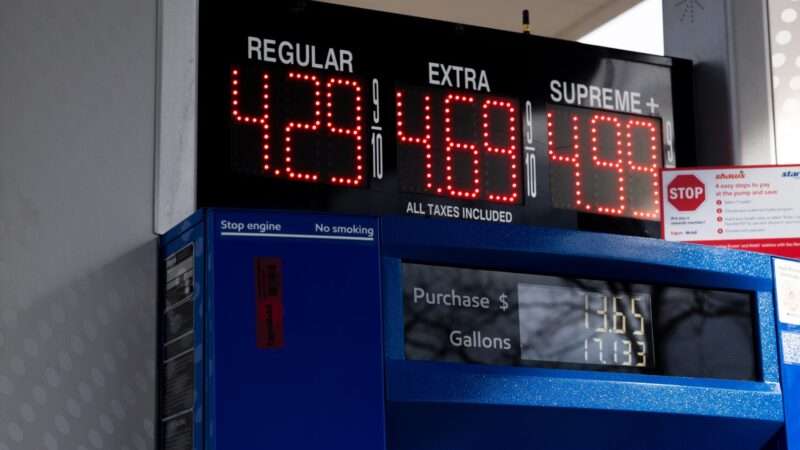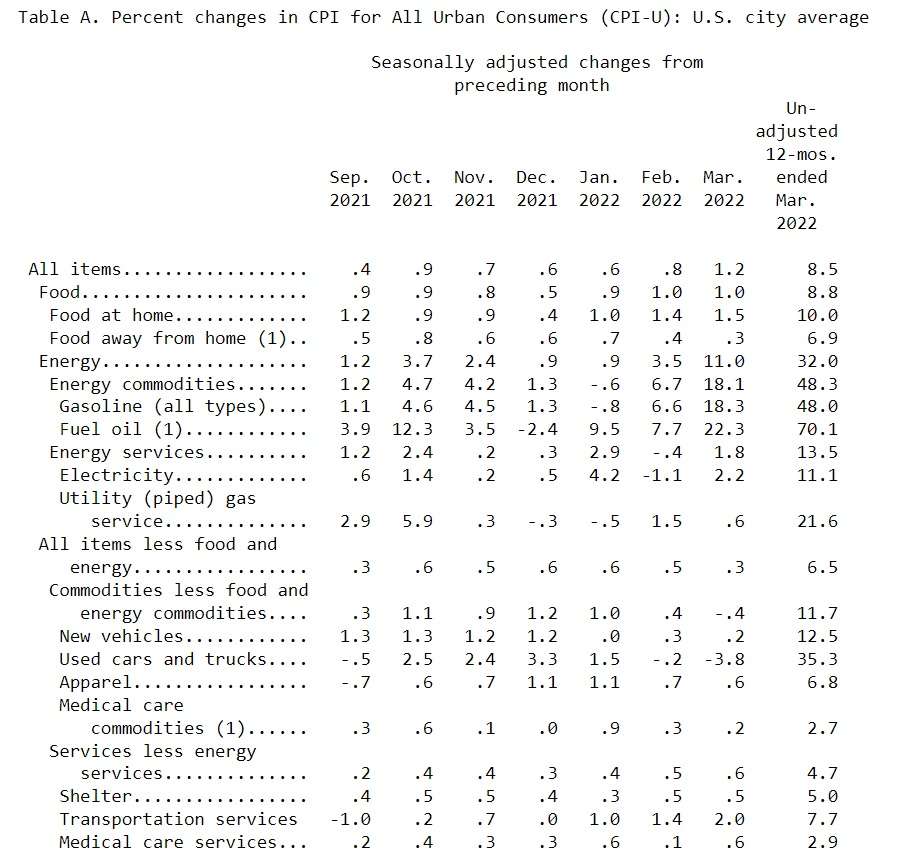
Driven by rising energy prices, inflation hit 1.2 percent in March and consumers are now paying 8.5 percent more, on average, than they were this time last year, according to new price data released Tuesday morning.
The annualized inflation rate reported by the Bureau of Labor Statistics (BLS) is the highest since December 1981, and the monthly rate for March signals an acceleration in price hikes—up from 0.8 percent in February. As expected, gasoline price increases driven by the war in Ukraine and subsequent worldwide reduction in imports of Russian gas were the biggest factor in March's inflation rate. Gas prices rose by 18.3 percent during the month, and energy prices as a whole climbed by 11 percent.
yikes pic.twitter.com/OMGjT4ZThz
— Andrew Van Dam (@andrewvandam) April 12, 2022
Wages are up about 5.6 percent, on average, over the past year. That's the fastest rate of increase in worker pay in decades, but inflation is swamping those gains. Over the past 12 months, energy prices are up 32 percent and food prices have jumped by 8.8 percent while all other goods have seen an average price increase of 6.5 percent, according to BLS data.
It's probably not news to anyone that gasoline prices have spiked in the past few weeks, but that aspect of the consumer price index is likely to dominate the news today. That's despite the fact that we've already seen some encouraging signs that gas prices are stabilizing or even falling: AAA reports that average national prices are down by about 8 cents since last week and around 20 cents lower than they were a month ago.
Later today, President Joe Biden will announce new steps intended to curb gasoline price increases. The Washington Post reports that the White House will allow a new blended form of gasoline that uses ethanol, known as E15, to be sold throughout the summer. In many parts of the country, air pollution rules prohibit the sale of E15 between June 1 and early September, but the White House plans to issue emergency orders overruling that ban.
Even though E15 is typically sold for a few cents less than regular unleaded gasoline, it is only available at a few thousand gas stations around the country. More than anything, this proposal really suggests just how limited the White House is in its ability to respond to inflation.
Milton Friedman famously said that "inflation is always and everywhere a monetary phenomenon, in the sense that it is and can be produced only by a more rapid increase in the quantity of money than in output." It is relatively easy for elected officials to increase the quantity of money, as they did during the pandemic by dumping more than $800 billion in stimulus checks into the economy—including making payments to people who never suffered any financial hardship. But fiscal policymakers have few options for sucking extra dollars out of the economy. Thus, Biden's options are mostly limited to easing some of the symptoms of inflation.
Actually bringing inflation under control will likely require higher interest rates throughout the economy, The Wall Street Journal reports. Last month, the Federal Reserve raised its benchmark rate for the first time since 2018, and another increase (perhaps as much as half a percentage point) may be coming soon.
FREE MINDS
Some of the roughly 25 million residents of Shanghai are pushing back against a COVID lockdown that has gone on for weeks, depriving people of food, freedom, and even contact with their COVID-positive children.
Reason's Liz Wolfe summarizes the growing backlash—or at least the parts that are escaping China's attempts to censor online information:
The situation has grown increasingly dire: Two people who tried to leave their apartment to walk their dog were confronted by a COVID prevention worker who they ended up attacking. At least one man allegedly tried to get the cops to apprehend him so he could at least have food to eat. Meanwhile, people who end up in central quarantine—state-administered facilities where COVID-positive people are sometimes sent so others in their apartment buildings don't get sick—complain about the fact that it's so unhygienic, it may well be facilitating greater spread of the virus (or even reinfection). Shared rooms, no running water, broken toilets (or disgusting ones shared by hundreds of people), and people crammed into overflow beds in hospital hallways have grown to be expected by the city's increasingly angry residents.
Top trending on Weibo today: "Why Can't People Infected with Covid-19 Isolate at Home?" (新冠感染者为什么不能居家隔离). The hashtag, initiated by Chinese media, was meant to explain why mandatory centralized isolation really is the best. Of 3405 comments, only 9 were viewable. pic.twitter.com/Uj1UvulxNX
— Manya Koetse (@manyapan) April 11, 2022
On Monday night, the State Department ordered non-emergency personnel and their families to leave the city "due to arbitrary enforcement of local laws and COVID-19-related restrictions."
FREE MARKETS
Texas Gov. Greg Abbott's (R) performative anti-immigration antics are now threatening crucial supply chains. The Texas Tribune reports:
Commercial traffic at a key South Texas border crossing has stopped after Mexican truckers on Monday blocked north- and southbound lanes on the Mexico side of the Pharr-Reynosa International Bridge in protest of Texas Gov. Greg Abbott's decision to have state troopers inspect northbound commercial vehicles — historically a job done by the federal government.
The bridge connecting Pharr and Reynosa is the busiest trade crossing in the Rio Grande Valley and handles the majority of the produce that crosses into the U.S. from Mexico, including avocados, broccoli, peppers, strawberries and tomatoes. On Monday, with trucks backed up for miles in Reynosa for the fifth day in a row, some produce importers in Texas said they have waited days for their goods to arrive and already had buyers cancel orders.
Vehicle inspections carried out by state police are taking between 45 minutes and an hour, according to the Tribune, and more than 500 trucks are backed up on the Mexican side of the border. Abbott's order directing the state's Department of Public Safety to conduct the inspections claims the new process is necessary to stop "cartels that smuggle illicit contraband and people across our southern border."
QUICK HITS
• After meeting with Russian President Vladimir Putin, Austria's chancellor told reporters that the war in Ukraine is likely to escalate. "The battle being threatened cannot be underestimated in its violence," Karl Nehammer said, according to The New York Times. Russia's military buildup in the eastern regions of Ukraine continues.
• Ukrainians are downloading more encrypted messaging apps, while Russians are turning to virtual private networks.
Signal, Starlink and air raid alarm app downloads surged in Ukraine. Russians flocked to VPNs. What trending apps are telling us about life during the war https://t.co/6khcy0e2x5 via @bbgvisualdata
— Bloomberg (@business) April 12, 2022
• Cops "skew more White, Republican, politically active, male, and high-income than their jurisdictions," according to a new study.
• Donald Trump endorsed fellow media-personality-turned-politician Mehmet Oz in the seven-way Senate primary race in Pennsylvania, citing Oz's history of being "popular, respected, and smart" and because the doctor said nice things about Trump's health.
• Are we really doing this again?
???? Due to increasing COVID-19 cases, @PhiladelphiaGov will move to Level 2: Mask Precautions beginning today. In order to provide a one-week education period for businesses, masks will be required in all indoor public spaces as of Monday, April 18, 2022. (1/4)
— Philadelphia Public Health (@PHLPublicHealth) April 11, 2022
• Are we really doing this still?
Extension of air travel mask mandate "absolutely on the table," says White House covid advisor Ashish K. Jha. https://t.co/z5BgcSSVd1
— Robby Soave (@robbysoave) April 11, 2022
The post Annual Inflation Hits 8.5 Percent, Highest Rate Since 1981 appeared first on Reason.com.








